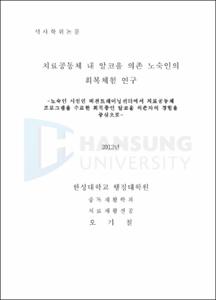치료공동체 내 알코올 의존 노숙인의 회복체험 연구
= Phenomenological Study on Lived Experience of Recovering aloholics in a Therapeutic Community for Homeless : Focusing the experiences of recovering alcoholics who have completed rehabilitation TC program in Vision Training Center for homeless
- Type
- Thesis
- Alternative Title
- 노숙인 시설인 비전트레이닝센터에서 치료공동체 프로그램을 수료한 회복중인 알코올 의존자의 경험을 중심으로
- Advisor
- 김선민
- Department
- 행정대학원 중독재활학과
- Issued Date
- 2011
- Publisher
- 한성대학교 행정대학원
- Files in This Item:
-
-
Download
 000001215250.pdf
기타 데이터 / 633.11 kB / Adobe PDF
000001215250.pdf
기타 데이터 / 633.11 kB / Adobe PDF
-
Items in Repository are protected by copyright, with all rights reserved, unless otherwise indicated.